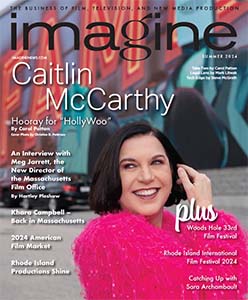People edit video for all sorts of different reasons. Some find it a fun, creative job. Some like the schedule, some are genuine raconteurs who love the new art of storytelling. And then there are some who use the medium of video to attempt to bring change and hopefully make the world a better place. This month in Tech Edge for women’s month, we are going to talk with Anne Macksoud from Old Dog Documentaries. Anne has been bringing change to the world her entire life and her desire to continue to bring change still burns white hot.
Who is Old Dog Documentaries and what do you do?
Old Dog Documentaries (www.olddogdocumentaries.org) is a non-profit video production company based in Woodstock Vermont and New York City. My partner, John Ankele and I have been producing, directing and editing documentaries since 1987. Before we met, John was in Nairobi, Kenya, involved in the struggle for independence in South Africa, training political activists in the use of media to bring about social change. From 1963-83, I was teaching photography, creative writing and music to high school students in Rye New York. As the “spirit” of the 60s penetrated the walls of even the small Catholic girls’ school where I was teaching, my students and I began putting the three disciplines (photography, music, writing) together to produce multi-projector slide/sound presentations on the social issues of the time – Viet Nam War, Civil Rights, global poverty, etc.
When John Ankele and I got together in 1987, we transitioned from film and A/V production to video. Given our histories of social activism, it is not surprising that we continued making documentaries about social, economic and environmental justice – films focusing especially on how US policy negatively impacts the poorest countries. Most of our films were made for college classrooms and various peace groups or religious groups. We also produced two PBS specials: Grow Old Along with Me, the Poetry of Aging and Life Stories, and a film for ABC/TV: SEARCH FOR SPIRITUALITY, a documentary uncovering the mystical roots beneath the surface of traditional beliefs and practices.
What projects are you working on now?
Right now we are spending all our time and money distributing our most recent film (and what we consider our most important film): THE WISDOM TO SURVIVE, Climate Change, Capitalism and Community.” The title of the film comes from the first line of a Wendell Berry poem, “If we will have the wisdom to survive…” Of the many films about Global Warming that have come out since Al Gore’s INCONVENIENT TRUTH, we think this film is the one that most successfully inspires action, and, at the same time, gives people a real sense of hope – not a hope that everything will be OK, but that they will be OK if they get involved in local action and become part of the growing citizen’s climate movement which is reminiscent of the civil rights movement. We are getting a great deal of feedback that this is true about our film, so we are not looking for a new film project until we have exhausted all the possibilities of getting the film screened in communities around the world. Our efforts are beginning to pay off! The film is increasingly being talked about and reviewed, and the screenings are beginning to multiply.
How is being based in rustic spot like Vermont?
Being a filmmaker in Vermont is great – there is a vibrant film community, some fine festivals and the inspiration of being in a beautiful, progressive state. What’s not great about Vermont, at least where I live out in the sticks, is that if something goes wrong with the edit system, the closest technical support is three states away, and I have had to pay for “home visits” several times. Even if I only need a audio cable, the nearest Radio shack is forty minutes away. Is the inconvenience worth it? Yes! Except when Hurricane Irene wiped out my edit suite and half of my home in 2011 and got me prepared (through painful experience) for the making of the film on Climate Change.
What are you using to shoot edit and how has that changed in the past 5-10 years?
My first documentary was shot in Ghana and Nigera in 1987. We had to lug around (in 105 degree heat) a monstrously bulky camera and ¾ inch (U-matic) VTR. The editing was worse – with dozens (and dozens) of VHS window dubs stacked up next to two VHS players. Since those “primitive” days, the changes have come fast and furious – next came Beta, then Beta SP, then Avid Xpress and Avid Xpress Pro and finally to Media Composer. The best thing for a small operation like Old Dog Documentaries is that we can, with non-linear editing and an HD editing system, do our own final cut, rather than spend half our budget at a fancy on-line edit suite.
How do you feel the post/television industry has been more accomodating to women?
I am very aware of the struggle of American women, especially women of color, to make their way in the film and television industry, or in any industry for that matter. But it is certainly better than when I started out. There were very few organizations that supported women, but because I was not working for anyone and was not trying get my films onto mainstream television, I did not come up against gender barriers…. and it probably helped that I had a male partner.
I see now that there are organizations like Women in Film & Television International (WIFTI) “dedicated to advancing professional development and achievement for women working in all areas of film, video, digital and other screen-based media.” But WIFTI is the first to admit that women are still greatly underrepresented in the industry. And if it is not great for American women, it is worse for women in the poorer countries around the world – in fact it is still true that 70% of the world’s poorest people are women and girls. That should be Old Dog Documentaries next film, now that I think of it!
Having been through the 1960’s, what changes did that decade bring that you still see today? Any long standing influences that you still see today?
Going through the 1960s, when I was in my early 20s, was the best preparation I could have had for what I am doing now. For me, it was a huge wake-up call. Growing up in the 40s and 50s was like being asleep – completely unaware of how things really are in the world. So even if it makes me old now (to have been in my 20s in the 1960s) I think of it as a gift. I think it’s time for another decade like the 1960s before it’s too late.
Steve McGrath is a Broadcast Sales Engineer for HB Communications. He has worked with NBC, ABC, CBS, NESN,
NECN, Fox, ESPN, Pentagon, Powderhouse and many others. You can reach him at [email protected]. Learn more, visit www.HBCommunications.com.



